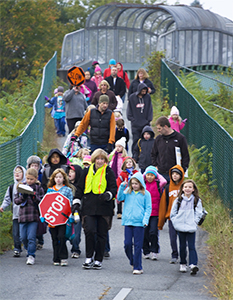SERESC Event & Conference Center
Bedford, NH
United States
 Providers from a variety of disciplines care for children with ASD and other neurodevelopmental disorders who struggle with challenging behaviors across home and school settings. This poses a challenge. This conference will provide opportunities to learn more about Positive Behavioral Interventions and Supports, an evidence-based treatment for challenging behaviors in children with neurodevelopmental disabilities.
Providers from a variety of disciplines care for children with ASD and other neurodevelopmental disorders who struggle with challenging behaviors across home and school settings. This poses a challenge. This conference will provide opportunities to learn more about Positive Behavioral Interventions and Supports, an evidence-based treatment for challenging behaviors in children with neurodevelopmental disabilities.
The one-day conference will include two keynote presentations.
Morning Keynote:
Whenever a large societal swing occurs, associated shifts in behavior norms and acceptability also can be experienced. The Southern Poverty Law Center, for example, indicated after the 2016 Presidential election, educators “reported that school climate had been negatively impacted.” The purpose of this presentation is to describe how our knowledge and experience with positive behavioral interventions and supports could be considered as an immediate, important, and effective preventive response for students with disabilities with dramatic shifts in school and classroom climate. Based on our prevention and behavioral sciences, we suggest that educators must “double down” now on their PBIS implementation to maintain school and classroom host environments that are safe, respectful, equitable, and effective for all students.
Afternoon Keynote:
Function-based support and teaching for generalized responding for students with disabilities will be discussed. The more complex and intensive the learning need, the more deliberate and explicit the teaching approach. The teaching and learning goal is efficient self-managed use of expected behavior within and across natural settings and contexts, especially, where ineffective behavior is more likely to be displayed. The purpose of this session is to review the core features of a specialized functioned based approach to behavior support and the importance of teaching social skills, in particular, so that accurate, sustained, and generalized responding is most likely to occur. Topics include function-based support, understanding and addressing behavior habits, phases of teaching and learning, and promoting general case responding.
Speakers & Topics
- 8:30 am: Sign In (Coffee and Light Breakfast)
- 9:00 am: Introductions
- Jennifer McLaren, M.D.
- Betsy Humphreys, Ph.D. NH-ME LEND
- 9:15 am: Doubling Down on Positive Behavior Interventions and Supports (PBIS) and Supporting Students with Disabilities in the Context of All
- George Sugai, Ph.D.
- 10:45 am: Break
- 11:00 am: Group Discussion on PBIS
- George Sugai, Ph.D.
- 12:00 pm: Lunch (Provided)
- 1:00 pm: Function-based Behavior Support and Teaching for Generalized Responding for Students with Disabilities.
- George Sugai, Ph.D.
- 2:30 pm: Break
- 2:45 pm: Group Discussion: Exploring Regional Resources for PBIS
- 3:45 pm: Wrap-Up
- 4:00 pm: Adjournment
Target Audience
Any provider, therapist, nurse or educator caring for someone with a neurodevelopmental disorder and interested in learning more about Positive Behavioral Interventions and Supports.
Accreditation
Dartmouth-Hitchcock is accredited by the Accreditation Council for Continuing Medical Education to provide continuing medical education for physicians.
Dartmouth-Hitchcock designates this live activity for a maximum of 5 AMA PRA Category 1 Credits™. Physicians should claim only the credit commensurate with the extent of their participation in the activity.
This CME is sponsored by: The Child Psychiatry Autism Program at DHMC; NH-ME LEND Program at Dartmouth College, Geisel School of Medicine; Maine LEND at the University of New England; The LEND Program at Boston Children's Hospital and Eunice Kennedy Shriver LEND Program at University of Massachusetts Medical School
$75
For registration questions, please e-mail clpd.support@hitchcock.org or call (603) 653-1234.
